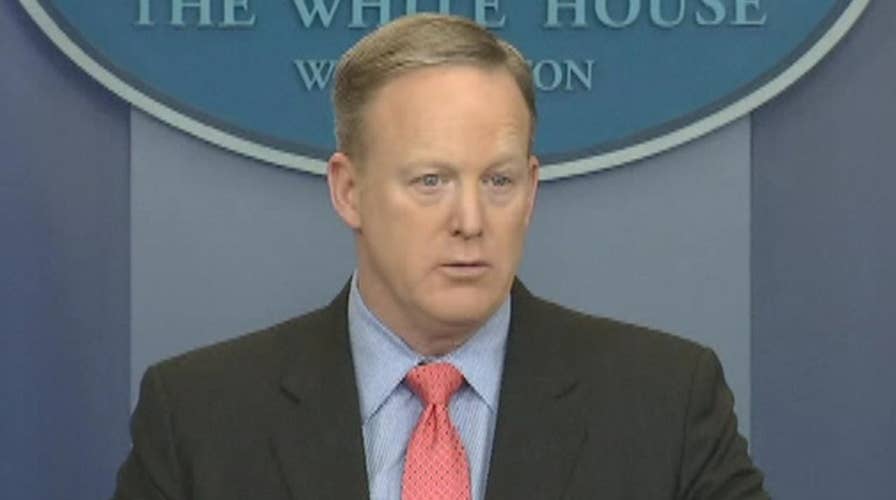Spicer: Yates removed for bewildering, defiant act
White House press secretary on replacing acting attorney general over refusal to defend executive orders
Sally Yates deserved to get canned. Now, the bar association should consider yanking her license to practice law.
In defying President Trump’s executive order on immigration, the Acting Attorney General flouted the law and violated ethics that govern lawyers.
It is not the prerogative of the Attorney General to decide what laws are constitutional. That is the job of the courts. As the chief law enforcement officer, she does not get to pick and choose which laws to enforce and which ones to ignore. She is duty-bound to defend and enforce all laws, including presidential executive orders.
If an Attorney General disagrees with an executive order, her ethical obligation under the code of Professional Responsibility is to communicate that to the president. If it cannot be resolved to her satisfaction, she has two choices: enforce the order or resign her position. This is plainly set forth in sections 1.13 and 1.16 of the Rules of Professional Conduct for the District of Columbia.
Yates did neither. Instead, she violated legal ethics by actively undermining the President and issuing her own order countermanding the President. She has no such authority. What would happen if other cabinet secretaries or federal officials committed the same acts as Yates? The result would be chaos and anarchy. The rule of law would vanish.
President Trump had ample justification for firing Yates. She committed an egregious violation of ethical standards and a serious breach of her duties.
Yates Is Not Qualified To Make A Constitutional Determination
Yates is not a constitutional law expert. Her career has been in prosecutions. But within the Department of Justice, there are experts on constitutional law. Some of them are in the Office of Legal Counsel at the DOJ. They reviewed the president’s executive order and gave it their approval as to form and legality. Yates deliberately chose to ignore their sound reasoning.
It is clear that Yates’ decision was political, not legal. How do we know? Look at what she wrote in her memorandum ordering attorneys not to defend the president’s executive order in legal challenges. She questioned whether the policy was “wise or just”. That is a political judgment. She fundamentally misunderstands her job and her duties.
The Supreme Court has repeatedly ruled that Congress and the executive branch have “plenary power” to regulate immigration. For more than a century the high court has upheld almost every federal immigration regulation against constitutional challenges. Much, if not all, of the Trump executive order is constitutional. Past presidents, including FDR, Truman, Carter and Obama, have excluded people from various countries that pose a threat. Those orders have survived legal challenges.
Why Would Yates Ignore Ethical Rules?
Either Yates does not understand the ethical canons… or she was grandstanding for personal gain. The evidence shows it is the latter.
Consider the address she delivered in November of 2015 to the 10th Annual Prosecution Summit in which she stated the ethical duty owed to clients:“It is your ethical responsibility to represent their interests, regardless of whether you think they’re really right or whether you even like them.”
Obviously, Yates understands the proper role of a lawyer… which means her recent conduct was likely done for political and personal profit.
As a holdover from the Obama Administration, she was already out the door in a few days. Her diplomas were probably off the walls and her boxes packed up. By instigating her own firing, she gets her face on the front page of every newspaper in America and overnight becomes a political darling of democrats and the left. That may pay dividends for her career.
But is a shameless act of self-promotion unworthy of a conscientious lawyer.
Schumer’s Predictable Condemnation
It did not take long for Chuck Schumer to get in on the act. He’s known on Capitol Hill as a guy who’d walk a mile for a camera.
On the floor of the Senate, he called it the “Monday Night Massacre”, an obvious allusion to the infamous Nixon-era “Saturday Night Massacre”.
But the firing of one person hardly constitutes a “massacre”, Chuck. Nixon fired the A-G, the Deputy A-G, and the special prosecutor, Archibald Cox, one Saturday night in 1973 in an a futile effort to cover-up the investigation into the Watergate scandal that threatened his presidency.It was a blatant attempt to obstruct justice. There is no comparison to what occurred Monday night.
Schumer also called Yates “brave” and a “profile in courage”. No, she was unethical. There should be an investigation by the bar association and, if appropriate, she should be sanctioned. Severely.
A Promise Broken
In her 2015 confirmation hearing, Yates told the Senate Judiciary Committee, “I believe the attorney general or deputy attorney general has an obligation to follow the law and the Constitution, and to give their independent legal advice to the president.”
Yates did none of that. She never bothered to advise the president about her misgivings. Nor did she follow the law.
Upholding the Constitution does not mean interpreting the Constitution in your own way. It means upholding the rules of law and the system of government established by the Constitution.
The Framers who crafted that esteemed document set forth those rules in three separate Articles. Congress will enact laws, the executive branch will enforce those laws, and the judiciary will interpret those laws.
As Acting Attorney General, Yates chose to abdicate the duties of her office in the executive branch and assume the duties vested solely in the judicial branch. In so doing, she failed to uphold her sworn oath to “well and faithfully discharge the duties of the office”. She undermined the public’s trust.
President Trump was right. Sally Yates betrayed the Department of Justice. And the American people.

